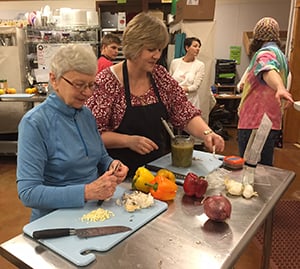When Rose Mary Lyke was diagnosed with ovarian cancer, she experienced a host of emotions, including disbelief, sadness and fear. She found a safe and positive outlet for her feelings by joining a cancer support group.
“After the first meeting, I was hooked,” Rose Mary says. “It was like sitting down with a group of friends.”
Rose Mary joined the Gynecologic Cancer Support Group in Corvallis three years ago. It is one of several support groups facilitated by Project H.E.R. through The Corvallis Clinic Foundation. During each monthly meeting, participants share practical information, including what to expect during treatment, how to manage side effects, process their feelings and stay positive.
“Our support groups provide a safe space for the individuals who attend,” says Parker Cochran, Project H.E.R.’s Resource Development Coordinator. “These groups are consistent, and they provide an opportunity for survivors to discuss any challenges they may be facing and to ask questions.”
Some support groups may offer educational opportunities, such as a guest physician, nurse or social worker to talk about a topic related to the group’s needs. Participants are also able to discuss issues with the group that they may not want to discuss with their loved ones.
“My family and friends are very supportive, but they can’t really relate to having cancer, so it’s good to sit down with a group of people who know exactly what you’re going through,” Rose Mary says.
“It’s comforting somehow to just say, ‘Well, this is where I am right now.’ And others will nod and say, ‘Oh, yeah, I’ve been there,'” says Carol Farnes, who helped start the Gynecologic Cancer Support Group in Corvallis. “Being part of this support group is a very positive experience. We share a lot, and we learn a lot.”
When is the right time to join a support group?
People join support groups at different stages in their cancer journey. Some feel they need emotional support shortly after diagnosis. Others find a support group beneficial once they’ve started treatment. Some people find support groups helpful once they’ve finished treatment and are coping with survivorship.
A typical support group session lasts one to two hours and varies in size. When trying a support group for the first time, attend at least three sessions—at that point, you’ll know if the group is right for you. If it doesn’t feel like a good fit, consider attending a different group.
Support groups at Willamette Valley Cancer Institute are drop-in; anyone can come at any time. For a list of cancer support groups in Eugene, Springfield and Corvallis, click here.



